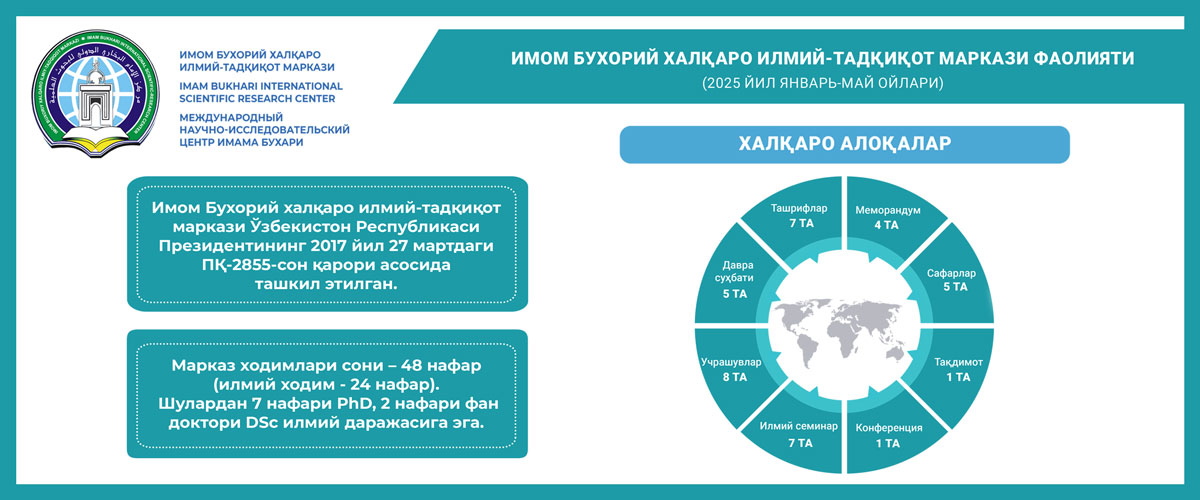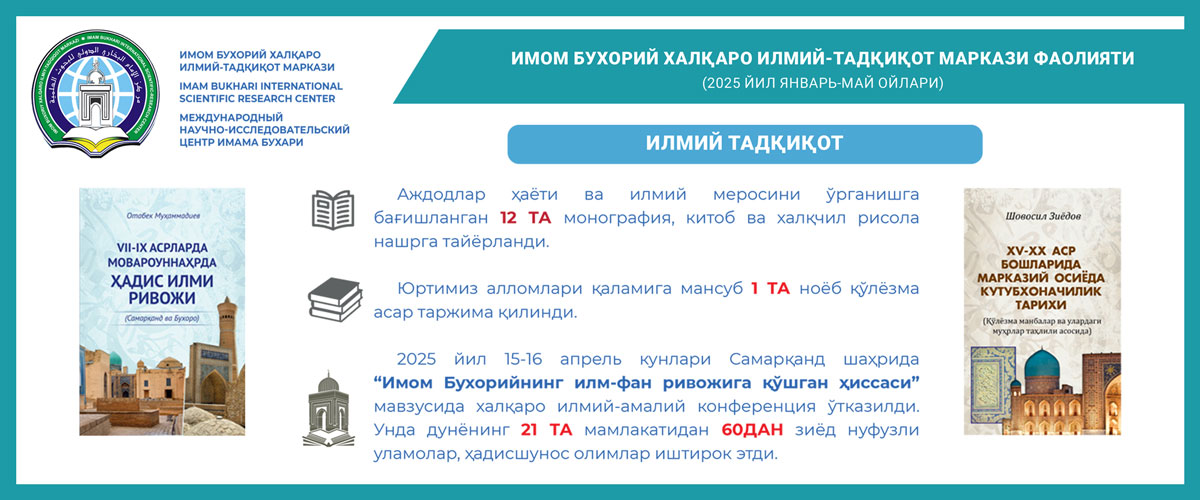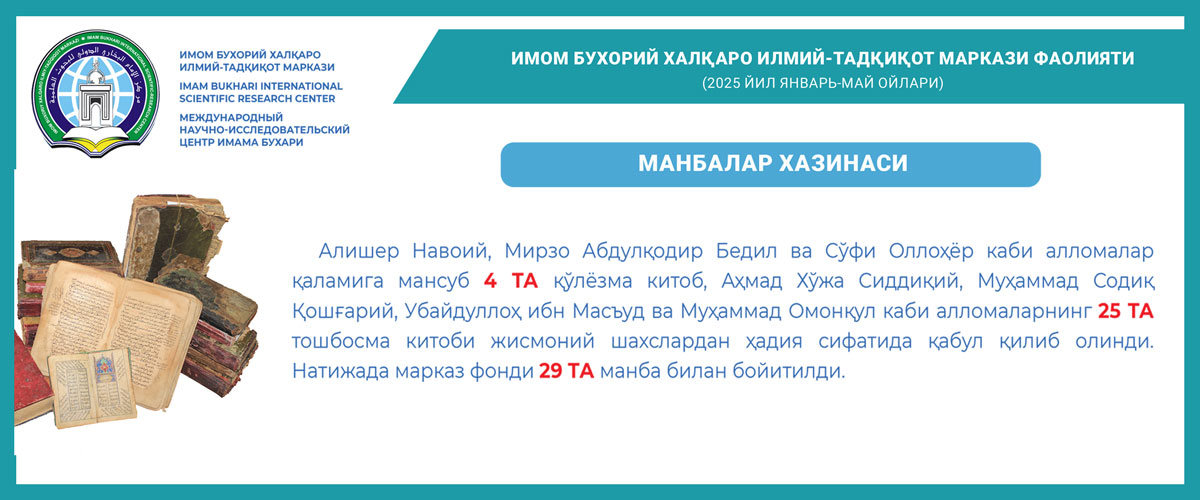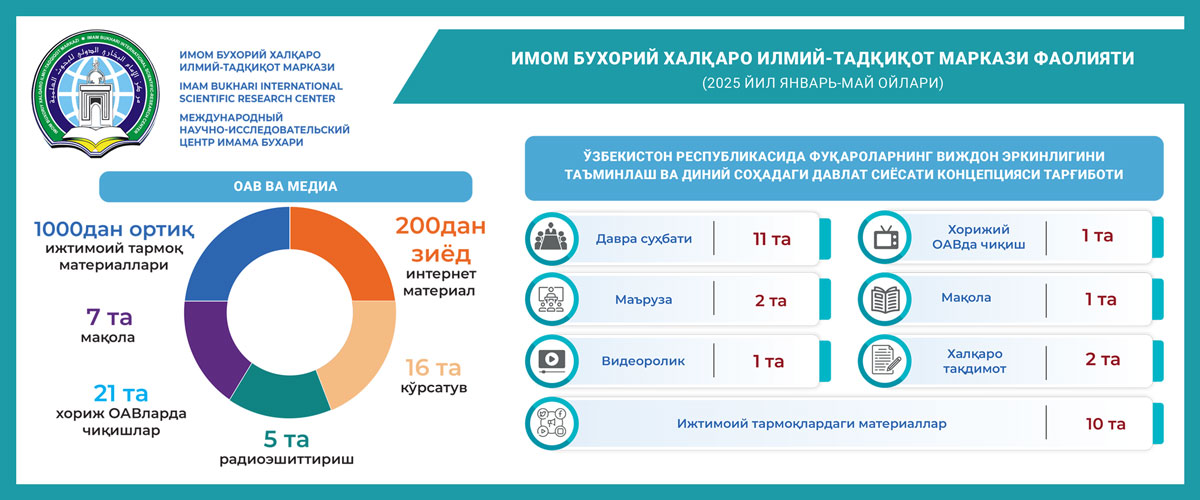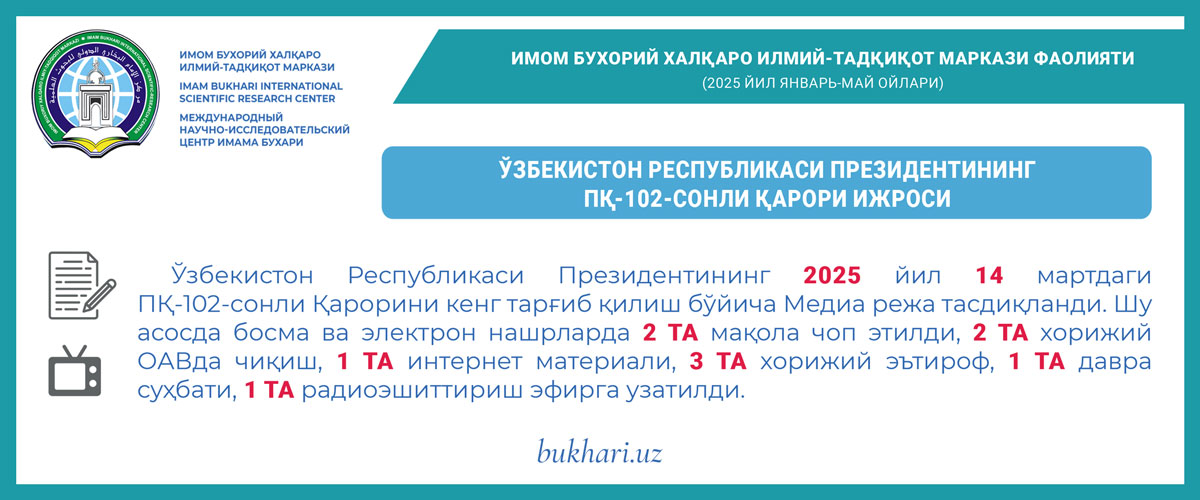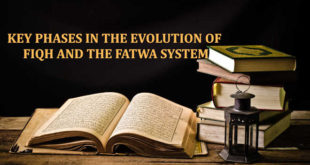On November 16, 1995, during its General Conference, UNESCO declared this date as the International Day for Tolerance and adopted a declaration on the principles of tolerance. Our homeland Uzbekistan, has since ancient times, been a land where diverse people and nations lived, each with their own unique culture, language, customs, and way of life, and followers of various religions.
Our President Shavkat Mirziyoyev in his speech at the 72nd session of the United Nations General Assembly emphasized: “We deeply value our sacred religion as an embodiment of our eternal values. We strongly condemn those who associate our sacred religion with violence and bloodshed, and we will never compromise with them. Islam calls us to kindness and peace, and to preserve true human virtues.”
Since the early years of independence, our country has paid special attention to preserving the values of various religions, creating the necessary conditions for all citizens to freely practice their beliefs, strengthening interfaith and interethnic harmony, and developing ancient shared traditions among them. Our Constitution states “All citizens of the Republic of Uzbekistan have equal rights and freedoms, regardless of gender, race, nationality, language, religion, social origin, beliefs, personal or social status, and are equal before the law.” This provision serves as a foundation for further strengthening unity and harmony among our multiethnic population.
All legal frameworks and necessary conditions have been established in our country to ensure interethnic and inter-confessional harmony. Promoting and reinforcing a culture of tolerance has become one of the key directions of our state policy. The main goal of tolerance is to encourage humanity to maintain peace and tranquility.
Today, Uzbekistan stands as a global example of religious tolerance and interfaith dialogue. Citizens of our republic, regardless of their religious affiliation, live and work together peacefully for the prosperity of our homeland. The legal foundations for freedom of conscience have been further improved, and all conditions have been created for representatives of various religions to practice their faith without any obstacles.
History shows that in any society where the principles of religious tolerance are upheld, mutual respect and sincerity prevail, and people live in peace and harmony. Just as development and prosperity are impossible without peace, lasting peace cannot exist without religious tolerance. That is why humanity has felt the need to live by the principles of tolerance since the beginning of life on Earth.
Central Asia, especially the territory of Uzbekistan, has long been home to various peoples with different cultures, languages, customs, and ways of life, who follow diverse religions and differ from one another.
Due to Uzbekistan’s geographical location at the crossroads of major trade routes and its economic relations with many countries, the religious and spiritual life of the local population as well as the customs of the region known as Mawarannahr, have significantly influenced the development of other cultures. This has served as one of the key factors in shaping unique interethnic harmony and religious tolerance.

Indeed, since ancient times, representatives of other religions have lived and developed alongside Islam on the land of Uzbekistan, contributing meaningfully to the spiritual growth of society.
We can also see many examples of such religious tolerance in the lives of our great ancestors. For instance, the great commander Amir Temur included Jewish and other non-Muslim soldiers in his army. His son Mironshoh was appointed to manage diplomatic relations with countries such as France, Spain, and England, which is a clear evidence of this inclusive approach. To this day, the people of India remember Zahiriddin Muhammad Babur and his descendants with respect, as the Baburids governed their state based on principles of religious tolerance.
In our sacred religion of Islam, the concept of tolerance is expressed through the term “muruwwat”, which broadly means placing beauty above ugliness, showing kindness, and approaching every reality from a perspective of grace. It also means treating beliefs, cultures, and traditions with respect and honor.
Like other religions, Islam has always taught humanity the essence of compassion (muruwwat), encouraging respectful and tolerant relations not only among fellow believers but also toward non-Muslims. Islam does not merely respect the previous Abrahamic religions, namely Judaism and Christianity but has shown boundless compassion toward their followers. Their rights have been protected by Islamic law, and their cultures and traditions have been treated with honor.
For centuries, Muslims have lived by these principles, demonstrating exceptional examples of compassion not only among themselves but also toward non-Muslims living among them, including ahl al-dhimma (protected non-Muslim citizens), becoming a model for all humanity. This is in accordance with the command of Allah and the guidance of His Messenger.
Ahl al-Dhimma or dhimmi (Arabic: “a person under protection”) refers to non-Muslims living under the protection of an Islamic state. Their religion, life, property, and other rights are guaranteed by Muslims. When a treaty is established with them, Muslims take responsibility for ensuring their safety and well-being in these areas. During the time of the Prophet Muhammad ﷺ, the Jews of Madinah lived peacefully and practiced their religion freely under such a treaty, becoming part of the ahl al-dhimma community.
Allah the Almighty says in Surah Al-Ma’idah: “O you who have believed, be persistently standing firm for Allah, witnesses in justice, and do not let the hatred of a people prevent you from being just. Be just; that is nearer to righteousness…” The Prophet Muhammad ﷺ also said: “Whoever harms a dhimmi (non-Muslim under Muslim protection), I will be his opponent on the Day of Judgment.” Taking this hadith seriously, Caliph Umar (may Allah be pleased with him) warned Amr ibn al-As (may Allah be pleased with him) before sending him to conquer Egypt: “Be careful! Do not make the Messenger of Allah your enemy.”

The Qur’an contains many verses promoting interethnic harmony, unity, and religious tolerance. For example, in Surah Al-Imran: “Say (O Muhammad): We believe in Allah and what has been revealed to us, and what was revealed to Abraham, Ishmael, Isaac, Jacob, and the descendants, and what was given to Moses and Jesus and the prophets from their Lord. We make no distinction between any of them, and to Him we submit.” And in the final verse of the same Surah: “O you who have believed, be patient, persevere, remain stationed, and fear Allah so that you may succeed.”
The Qur’an calls for recognition of the previous holy scriptures-Psalms, Torah, and Gospel-and urges respect for the People of the Book, i.e., followers of other religions. It invites people to love, cooperation, and overcoming all forms of discord and conflict.
Islamic history also offers many examples of high-level tolerance. For instance, after the Prophet (peace be upon him) migrated to Medina, he signed a treaty with the Jews living there, establishing principles of peaceful coexistence and cooperation for the benefit of society, and he lived by those principles.
During the Battle of Khaybar, among the spoils obtained by the Muslims were several pages from the Torah. When the Jews came and requested the return of those pages, the Prophet Muhammad ﷺ ordered that they be returned to them. This act reflects one of the noble morals of Islam, respecting the sacred values of other religions. As a result, the pages, which were considered sacred by the Jews, were returned to them without any damage. This incident is a clear example of religious tolerance in Islam.
Imam Waqidi and Ibn Asakir narrated from Abdullah ibn Abu Hudrah al-Aslami: “We came to Jabiyah with Umar ibn al-Khattab (may Allah be pleased with him). He saw an elderly man from among the ahl al-dhimma (non-Muslim citizens under Muslim protection) begging for food. When asked about him, it was said, ‘He is from the ahl al-dhimma, and he has grown old and weak.’ Umar (may Allah be pleased with him) then canceled the jizya (tax) that was imposed on him and said, ‘You took jizya from him when he was strong, and now that he is weak, you let him beg for food?!’ Jizya, an Arabic word which means poll tax, was a tax initially levied in the Arab Caliphate and later in other Muslim states (including Central Asia) on non-Muslim citizens. Jizya was imposed on those who had reached maturity, while the elderly, women, children, slaves, and those unable to work were exempt. It was generally collected in the form of money or goods.
The Caliph Umar ibn al-Khattab then ordered that ten dirhams be paid to him regularly from the public treasury (Bayt al-Mal), as he had a family to support.” Bayt al-Mal (Arabic: “House of Wealth”) refers to the state-owned property in Islamic countries or a building where valuable items are stored. Bayt al-Mal was first established by Caliph Umar ibn al-Khattab (may Allah be pleased with him). The wealth accumulated in it primarily came from taxes such as kharaj (land tax), jizya (poll tax), zakat (alms), and khums (one-fifth levy).
The Holy Qur’an commands Muslims to treat the places of worship of other religions, such as monasteries, churches, and synagogues with respect. One of the important teachings of the Qur’an is to show deep reverence and honor toward the places of worship of other faiths, such as Christians and Jews. According to the Qur’an, the places where the People of the Book worship such as monasteries (where monks retreat), churches (Christian places of worship), and synagogues (Jewish places of worship) are under the protection of Allah.
In Surah Al-Hajj, it is stated: “Had Allah not repelled some people by means of others, monasteries, churches, synagogues, and mosques, where the name of Allah is much mentioned, would surely have been destroyed. And Allah will certainly help those who help His cause. Indeed, Allah is All-Powerful, Almighty.” This verse clearly demonstrates the importance for every Muslim to deeply respect and protect the places of worship of the People of the Book.
The Prophet Muhammad ﷺ set an example for us in showing respect to people of other religions and ethnicities. One day, while sitting with his companions, a funeral procession passed by. The Prophet stood up out of respect for the deceased. The companions said, “O Messenger of Allah, the deceased is a Jew.” The Prophet replied, “Was he not a human being?” With this response, he expressed his displeasure and gave a practical lesson on how to treat people of other faiths.
After migrating to Medina, the Prophet (peace be upon him) signed a treaty with the Jews living there, establishing principles for peaceful coexistence and cooperation for the benefit of society. He maintained good personal relations with people of other religions, treated them kindly, gave them gifts, and accepted gifts from them.
For example, it is well known in history that the Prophet wore garments gifted to him by non-Muslims. He hosted Christian guests from Abyssinia in his mosque and said, “They honored our companions, and I love to honor them myself,” and personally served them. He also welcomed a group of Christians from Najran into his mosque and allowed them to perform their worship there (Shaykh Muhammad Sodiq Muhammad Yusuf, 2010).
The idea of interfaith tolerance is not only for the religious but also envisions cooperation among all members of society in the path of goodness. It is a vital condition for peace and stability. Since ancient times, mosques, churches, and synagogues in our major cities have served their worshippers freely, and even during difficult periods of history, no religious conflicts have arisen, an evidence of our people’s rich experience in interfaith tolerance.
For this reason, Uzbekistan’s strong traditions of religious tolerance are recognized by the international community. A representative of the Jewish community, R. Beneman, noted that the first synagogue in Bukhara was built as early as the 8th century, and that even then, sufficient conditions were provided for Jews to freely practice their religion alongside other faiths. He wrote “While Judaism was persecuted in medieval Europe and the Byzantine Empire, in Central Asia it enjoyed equal rights with other religions.” (Beneman, 2002)
The Uzbek people’s tolerance and respectful attitude toward different beliefs and cultures are sincerely acknowledged by representatives of various nationalities and ethnic groups. Today, more than 130 ethnic groups, 16 religious denominations, and over 2,200 religious organizations live peacefully in Uzbekistan, adhering to the principles of religious tolerance, indicating a clear evidence of our claims.
Thus, it becomes evident that for a society to develop, remain peaceful and harmonious, people must embody human virtues such as mutual compassion, respect for elders, kindness to the young, observance of kinship and neighborly rights, and tolerance toward people of other faiths. Indeed, interethnic harmony, religious tolerance, and unity are among the key criteria for the development of a civil society, and these principles are the guarantee of our nation’s progress and peace.
Assoc. Prof. Otabek Mukhammadiev is Deputy Director of Imam Bukhari International Scientific Research Center, Samarkand, Uzbekistan
Source: islamicity.org
 Imom Buxoriy xalqaro ilmiy-tadqiqot markazi bukhari.uz
Imom Buxoriy xalqaro ilmiy-tadqiqot markazi bukhari.uz
